Re Ian Bremmer 'Could third-party candidates upend the 2024 US election?' 3 April The current political movement in the USA…
Shifting sands: Canada, the world and the tar sands
Written by Diana Thebaud Nicholson // November 29, 2010 // Canada // 2 Comments
(Sierra Club) Environmental Impacts of Tar Sands Development; (Pembina Institute) Tar Sands Watch; Oil Notes on WednesdayNight.com; (National Geographic March 2009) The Canadian Oil Boom – Scraping bottom; More on oil & tar sands
David Schindler et al. Oil sands development contributes polycyclic aromatic compounds to the Athabasca River and its tributaries (2009)
The tar sands consist of a mixture of silica sand, minerals, clay, water, and most importantly, crude bitumen. The process of converting bitumen so that we can use it to power our cars, heat our homes, and transport our food is not easy.
It’s estimated that two tonnes of earth must be excavated to produce one barrel of thick tar-like bitumen. And it requires as much as three barrels of fresh water from the Athabasca River to make one barrel of bitumen. It also takes a huge amount of energy to extract the oil from the sands.
Now think about this: each day Canada exports one million barrels of bitumen to the United States.
– David Suzuki: Tar sands wealth comes with environmental costs
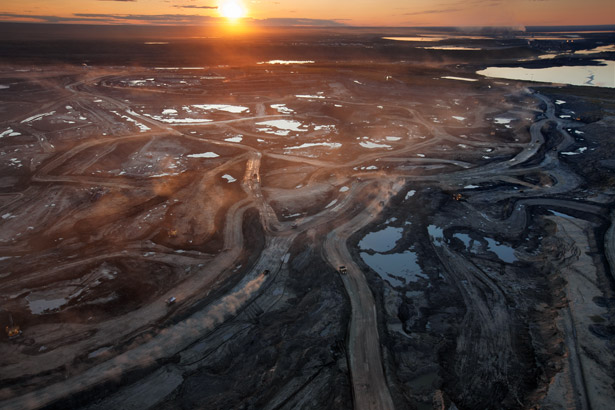
29 November
Sables bitumineux: le lobbyisme d’Ottawa contraire à l’avis d’Environnement Canada
(La Presse) La croisade d’Ottawa pour réduire la portée de la loi américaine sur les combustibles propres, laquelle pourrait nuire à l’industrie canadienne des sables bitumineux, était planifiée, concertée et coordonnée, et ce, contre l’avis de fonctionnaires d’Environnement Canada.
23 November
A view from Calgary in defense of Ezra Levant —
Want an ethical investment? Try Alberta’s oilsands
Every drop of Alberta oil is one less drop from some fascist theocracy or warlord
(The Gazette) With a view to worldwide production of oil and the many questionable regimes that oversee such extraction, in comparison to BoyScout Canada, Levant puts it this way: “Every drop of oil from Alberta is one less drop from some fascist theocracy, or some brutal warlord; one cent less into the treasuries of Russia’s secret police and Al-Qa’ida’s murderers.”
Is Canadian oil ethical? In a world with few Boy Scouts, yes, actually, it is.
21 November
Ottawa targets oil-sands opponents
(Financial Post) Three major departments in the federal government have been co-ordinating a communications strategy with Alberta and its fossil-fuel industry to fight international global-warming policies that “target” oil-sands production, newly released federal documents reveal.
26 October
Ducks land on Syncrude, Suncor, Shell tailings ponds
230 dead birds counted so far at Syncrude’s Mildred Lake facility
22 September
Alberta tar sands praised as ‘ethical oil’
Alberta’s fields of bitumen have been called “tar sands” by environmentalists, and “oil sands” by the industry and province. Now some supporters are trying on a new term for the hydrocarbons that come out of Alberta: “Ethical oil”
11 September
Oilsands campaign hits Times Square
The Alberta government is hoping to change negative public perceptions of the oilsands by running a series of ads in New York’s Times Square.
10 September
James Cameron to visit tar sands
(APTN) Cameron attended the UN Permanent Forum on Indigenous Issues in New York City this spring and was invited to visit the tar sands by former Mikisew Chief George Poitras during a special screening of Avatar in the city.
U.S. Speaker calls for cut in oil imports
(Globe & Mail) Nancy Pelosi educates herself about Canada’s oil sands, but makes clear her distaste for fossil fuel
For the oil sands sector … Ms. Pelosi’s trip came at a tough time.
Hours after the meeting, Suncor was charged by Alberta Environment with providing misleading information to the government about water runoff at a stalled oil sands construction site. The province alleges that Suncor unlawfully allowed dirt and water to leak from the site into the Athabasca River in May, 2008.
Then late in the day, Enbridge announced that it had closed a major oil pipeline in Illinois due to a leak, even as it continues to clean up a large spill that resulted from a pipeline break in Michigan this summer.
9 September
Pelosi hears oilsands concerns
(CBC) Canadian environmentalists say they are encouraged by meetings with U.S. Speaker Nancy Pelosi, describing her as committed to reducing fossil fuels and interested in learning more about the impact of Canada’s oilsands.
Several environmental and First Nations leaders met Thursday in Ottawa with Pelosi and Ed Markey, chair of the U.S. House of Representatives select committee on energy independence and global warming.
7 September
Alberta on defensive over oil sands bird deaths
For the second time in less than a week, the Alberta government has been forced to defend its environmental record tied to the oil sands after researchers Tuesday published a report arguing up to 5,029 birds may die each year because of the toxic tailings ponds.
2 September
Alberta premier calls for review into oilsands-linked river toxins
(Global) Alberta Premier Ed Stelmach on Wednesday called for a meeting of scientists to figure out why a University of Alberta study found high levels of toxins near oilsands sites, while an industry-led monitoring program did not.
The results of the two-year study were published in the Proceedings of the National Academy of Sciences and found that oil sands boost the concentration of dangerous metals in the Athabasca watershed.
30 August
Oil sands polluting Canadian river system: study
(Reuters) – Canada’s vast oil sands operations are polluting the Athabasca River system, researchers said on Monday, in a report that is bound to fuel the environmental battle over developing the resource.
Contradicting Alberta government assertions that toxins in the watershed occur naturally, the researchers said mercury, arsenic, lead and cadmium are among 13 toxins released into the Athabasca, which flows north through the oil sands operations.
The findings of the study, coauthored by University of Alberta biological scientists Erin Kelly and David Schindler, should be a signal for the Alberta provincial government to consider limits on oil sands development, Schindler said.
19 August
‘Constant Denial’: Liberal Report on Tar Sands Is Scathing
Grits’ dissenting report on two-year parliamentary study calls for sweeping reforms.
(The Tyee) A dissenting Liberal report on the highly contentious findings of a two-year long parliamentary study on the impact of the tar sands on Canada’s freshwater supplies has accused both industry and government of being in a state of denial about “the potential negative consequences the industry might be having on a vital Canadian resource.”
28 July
Enbridge spill yields fresh ammo for oil sands critics
On heels of BP’s catastrophic Gulf blowout, environmentalists are painting both incidents with the same brush
The high-profile accident and resulting political outcry comes at a sensitive time for the Canadian industry, which is looking expand pipeline access and exports to the U.S. Canadian officials have sought to quietly capitalize on BP’s catastrophic blowout in the Gulf of Mexico by positioning the oil sands as a greener, safer alternative to offshore crude.
But there is growing opposition to oil sands pipelines – whether Enbridge’s planned Northern Gateway project to the West Coast or Enbridge Keystone XL line to the U.S. Gulf Coast. And the Michigan spill, while small compared to the estimated 800 million litres that have spewed from BP’s well, provides fresh ammunition to the industry’s critics.
27 July
BP should end the oil age early
The Gulf oil spill should spur BP to leave Canada’s tar sands alone, and focus their energy on renewable power
(The Guardian) … the company’s proposed increased exploitation of Canada’s tar sands would see billions bumped into an operation that devastates both the local environment and the global climate (greenhouse gas emissions from tar sands exploitation are three times as great per barrel as from conventional crude). BP’s interest in these high-risk areas reveals the cynical dishonesty behind its “beyond petroleum” branding.
6 July
Politicians cancel oilsands pollution probe, tear up draft reports This should make all those investors eyeing Canada’s resources (see below) very happy.
29 June
The BP Oil Spill Winners
(Foreign Policy) Are you a politically stable country with untapped oil reserves that won’t soon be trapped behind a daunting web of post-spill moratoriums and regulations? If so, the world’s energy companies would like to have a word with you. Expect newfound interest in Australia’s offshore oil reserves, for instance.
But the big winner here is Canada, whose oil reserves, mainly in the form of Alberta’s gargantuan oil sand deposits, are the second largest in the world behind Saudi Arabia’s. Extracting crude from oil sands — a process that combines the kid-glove delicacy of oil drilling with the subtle artistry of strip-mining — is the most pollution-intensive and expensive way to get oil out of the ground, a grueling endeavor that levels forests and leaves toxic runoff in its wake. But Canada’s oil sands are anticipated to become the largest source of U.S. oil imports this year anyway — and since the BP spill, Canadian boosters have been busy talking up Alberta oil as a safer, cleaner alternative to offshore drilling in the Gulf of Mexico.
27 June
Harper rejects advice to eliminate tax incentives for oil patch
Prime Minister Stephen Harper is rejecting advice from his officials to eliminate tax incentives for the oil patch.
At the last G20 Summit in Pittsburgh, member countries agreed to figure out where governments were subsidizing fossil fuel consumption and production — and then move to eliminate such subsidies.
In Canada, the Finance Department recommended that Harper lead by example and get rid of tax incentives that encourage oil and gas production. … Harper has opted instead to reiterate actions taken in the past, rather than volunteer any additional gestures. … the Canadian “action plan” on fossil fuels consists mainly of phasing out accelerated capital cost allowances for oil sands production.
25 June
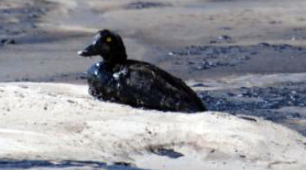 Syncrude guilty in Alberta duck deaths
Syncrude guilty in Alberta duck deaths
Oilsands giant Syncrude was found guilty Friday on both environmental charges it was facing in connection with the April 2008 deaths of 1,600 ducks in one of its northern Alberta tailings ponds. Syncrude was charged under the Alberta Environmental Protection and Enhancement Act and the federal Migratory Birds Convention Act with failing to protect migratory birds from a toxic tailings pond.
In a decision delivered to a packed courtroom in St. Albert, Alta., provincial court Judge Ken Tjosvold said Syncrude didn’t exercise due diligence in preventing the birds from landing on the water.
He pointed to evidence presented during the trial that showed Syncrude made staffing cuts and actually scaled back its bird-deterrent system before the ducks died. In Depth: The Syncrude duck trial
23 June
Don Martin: Ignatieff ‘s not-so-slick oil proposal
Mr. Ignatieff’s vow, should he ever become prime minister, singles out for a ban one vital link — between the oil sands and China’s voracious energy thirst — that would give the oil sands a competitive alternative to an America that views the resource as dirty energy to be priced at a discount. The Northern Gateway proposal, a 1,200-kilometre, $5.5-billion pipeline linking Edmonton to the West Coast by 2016, would send 525,000 barrels a day to markets like China, which has an ownership stake in the oil sands.
22 June
As Reuters predicted a week ago BP says oil sands plans unchanged
BP bought a majority stake in Calgary-based Value Creation Inc. in March, and plans to forge ahead on their Terre de Grace project, northwest of Fort McMurray.
Further, the British company has not changed its plans with respect to its Sunrise oil sands project, which it shares with Husky Energy Inc. BP and Husky are joint partners on the $2.5-billion steam-assisted gravity drainage effort in northern Alberta. Both partners must sanction the project, meaning they decide whether to proceed, and neither BP nor Husky has made a call.
15 June
Analysis: Offshore Drilling Backlash May Boost Shale, Oil Sands
(Reuters/Planet Ark) The massive Gulf oil spill may hasten the development of shale gas and oil sands, North America’s two most important emerging energy sources.
The risk of pursuing deepwater oil reserves dwarfs the environmental concerns facing both onshore sectors.
Neither Canadian oil sands petroleum nor natural gas from U.S. shale beds will immediately substitute for delayed Gulf of Mexico crude output in the wake of a six-month drilling moratorium. Still, their development should speed up thanks to the search for less-risky energy sources.
17 May
Oil Sands Riskier than Gulf Spill, Say Investor Groups
(IPS) As the oil leaking into the Gulf of Mexico destroys habitat and livelihoods, the extraction of oil from Canadian oil sands deposits is having a similar impact on fragile ecosystems and communities deep in the North American interior.
The dramatic impact of oil sands expansion should give the companies involved and their investors pause, cautions a new report Canada’s Oil Sands: Shrinking Window of Opportunity commissioned by Ceres, a coalition of investors and environmental groups, and authored by the financial risk management group RiskMetrics.
15 April
Greens Launch NAFTA Action On Canada Oil Sands
Environmental groups launched a complaint against Canada under the North American Free Trade Agreement Wednesday, saying the country has failed to enforce anti-pollution rules governing its vast oil sands.
12 April
Sinopec invests $4.65bn in Canadian oil project
(BBC) China’s Sinopec oil company is to pay ConocoPhillips $4.65bn (£3bn) for a stake in a Canadian tar sands projects.
The acquisition of the 9% stake in Syncrude Canada is one of China’s largest investments in North America. (Financial Post) Syncrude stake tops China’s investments in Canada
25 March
Coastal First Nations Oppose Canada Tar Sands Pipeline
Enbridge Inc.’s plan is to open export markets for tar sands oil outside the United States — notably China. However, the Coastal First Nations see the pipeline as a major threat to their territory and way of life.
14 February
So much for Mr. Prentice’s pious words
Canada looks to China to exploit oil sands rejected by US
(The Guardian) Canada, faced with growing political pressure over the extraction of oil from its highly polluting tar sands, has begun courting China and other Asian countries to exploit the resource.
The move comes as American firms are turning away from tar sands because of its heavy carbon footprint and damage to the landscape.
Whole Foods, the high-end organic grocery chain, and retailer Bed Bath & Beyond last week both signed up to a campaign by ForestEthics to stop US firms using oil from Canadian tar sands. The Pentagon is also scaling down its use of tar sands oil to meet a 2007 law requiring the US government to source fuels with lower greenhouse gas emissions.
Major oil companies such as Shell are also coming under shareholder pressure to pull out of the Canadian projects. Earlier this year, Shell announced it was scaling back its expansion plans for the tar sands after a revolt by shareholders.
2 February
The State of oil
OILSANDS FIRMS RECEIVE ADMONITION
(RCI) Canada’s environment minister, Jim Prentice, is warning that the country must be more careful about oilsands development. He says the Canada risks receiving a bad reputation unless it does a better job of developing the oilsands. Mr. Prentice says the Conservative Party government supports continued expansion of the oilsands in the western province of Alberta. But he also says large energy companies need to do more to protect the environment, as Canada seeks to reach its targets under the Copenhagen climate change accord. This past weekend, Mr. Prentice announced that Canada will cut its carbon emissions by 17 per cent from 2005 levels over the next 10 years. Countries that attended the climate change conference in December were supposed to outline their own emission-reduction targets before the United Nations final deadline of Jan. 31.
January 2010
(Policy Options December 2009-January 2010) Oil producers know theirs is a very political world, in which the very few remaining heavy-oil players are open to private investment. Canada, with its enormous tar sands deposits, sits in a league of its own in this regard. More often than not, state-controlled interests have cornered most of the globe’s heavy-oil assets. Big government is alive and kicking in 2009, and it is not always on the same page as private investment.
30 December
PetroChina pourra exploiter les sables bitumineux d’Alberta
Le ministre canadien de l’Industrie Tony Clement a approuvé mardi une transaction entre PetroChina et Athabasca Oil Sands Corporation donnant au groupe chinois le contrôle de deux projets d’exploitation de sables bitumineux, MacKay et Dover, en Alberta.
7 December
Pollution levels increase due to oilsands operations: study
(ctvedmonton.ca) A University of Alberta study suggests that pollution levels from Alberta’s oilsands are nearly five times greater than official estimates. The study, spearheaded by U of A biological sciences professor David Schindler, shows levels of polycyclic aromatic compounds (PAC), a group of organic contaminants containing several carcinogens, have increased the closer they got to the oilsands developments and reached a point where the airborne particles left an oily slick on top of melted snow. Researchers say the toxic emissions are the equivalent of a major oil spill repeated every year. Globe & Mail: Oil sands emissions polluting waterways, study finds and ‘Dirty’ image puts Canada in climate doghouse at Copenhagen
10 November
World needs Canada’s ‘dirty oil’, says IEA
… even as it called on leaders to make decisive moves to slash greenhouse gas emissions at a United Nations-sponsored negotiating session next month.
Many analysts and politicians say the oil sands sector’s future, in a world where many are targeting it due to its “dirty oil” reputation, depends on expanded use of carbon capture-and-storage technology.
26 September
David Sachs: Alberta’s oil hangover
(The Gazette) In Fort McMurray, it’s been a bad year for the cocaine and snowmobile dealers but boom times for the repo companies; thousands of oil sands workers are returning to places as far removed as Newfoundland, China and the Philippines; and Alberta’s provincial government is forecasting a $6.9-billion shortfall this fiscal year, its first deficit in 15 years.
The environment is the giant elephant in the room. It was ducks that reminded the world of the problem in April 2008 – 500 died after landing in a Syncrude tailings pond, an image that resonated worldwide.The extraction of oil from the sands requires massive quantities of water, diverted from the Athabasca River, and natural gas to provide energy for the process. This on such a large scale that the burning of that natural gas represents a major component of Canada’s greenhouse gas emissions. The mining itself digs up vast swaths of boreal forest and ancient peat; although oil sands companies are required to “restore” the land, and impressive efforts are under way, this local environment will never return to its pre-mining state. The tailings ponds are kilometres-long lakes of sludge, actually visible from outer space. On top of all this, there are now questions whether contaminated water is leading to higher rates of cancer among the native community of nearby Fort Chipewyan.
25 September
Don Martin: Canada’s oil sands: dirty, but needed
(National Post) Canada’s oil sands may take a daily beating in the international media and from environmentalists, but the arithmetic of American consumption and supply all but ensures a long, prosperous future for our dirty oil.
15 September
Shell Idles Alberta Oil-Sands Mine Because of Protest
(Bloomberg) The protest, which aims to call attention to plans for “dirty oil-sands growth,” comes on the eve of Canadian Prime Minister Stephen Harper’s visit with U.S. President Barrack Obama, Greenpeace said.
13 September
Oilsands emit more than entire countries: report
Alberta’s oilsands produce more greenhouse gas emissions than some European countries right now and will produce more than all of the world’s volcanoes in just 11 years if the pace of development continues, says a new report “Dirty: How the Tarsands Are Fuelling Global Climate Change”.
The report says almost $200 billion has been or will be invested in the projects in northern Alberta, including not only the oilsands but pipelines, refinery expansions and other associated infrastructure. It adds that the liabilities are a nearly threefold increase in greenhouse gas emissions, enormous amounts of natural gas used and wasted to produce synthetic oil from bitumen — which consists of tarry pitch, or asphalt — and the “economic nightmare” of carbon capture and storage, a technology that has yet to be developed.
1 September
CHINA [is] IN OIL SANDS DEAL
(FP) China, using its significant financial firepower, snapped up majority stakes in two oil sands projects yesterday in a way experts say illustrates the energy-hungry country’s strategy to convince Canada it can be a palatable and necessary partner in the huge crude reserves buried in northern Alberta.
Don Martin: The Chinese government pushed its shovel deep into Canada’s energy motherlode on Monday when it announced a $2-billion stake in a five-billion-barrel reserve of “dirty oil” that Americans increasingly find unworthy of fuelling their vehicles. The 60% claim by PetroChina in two projects owned by Athabasca Oil Sands Corp., while small compared to the great gobs of capital pouring into oil sands expansion and extraction, are the global giant’s largest investment in Canadian energy yet.
And China usually buys into product it aims to consume.
13 August
(Pembina Institute) Will Saskatchewan Oil Sands be a Carbon Copy of Alberta’s Mistakes? Comprehensive 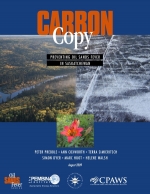 new report outlines risks of poorly managed oil sands development and proposes a new approach
new report outlines risks of poorly managed oil sands development and proposes a new approach
Oil sands development in Saskatchewan should be paused immediately so that appropriate planning and regulatory processes can be put in place before further development occurs. A new report, Carbon Copy: Preventing Oil Sands Fever in Saskatchewan, outlines key steps that would be required to ensure any oil sands development proceeds responsibly.
27 July
Shifting Sands: How a changing economy could bury the tar sands industry
This report, co-authored by PLATFORM, Greenpeace and Oil Change International, points to a series of trends emerging from the growth forecasts of OPEC, the IEA and the EIA as evidence that the oil market could be undergoing a permanent structural shift. (Natural Choices)
16 July
Canada’s dirty secret
Canada isn’t being punished for its geographic reality. It is finally being called out for presenting itself as environmentally friendly, while under the Conservative government green issues have been completely sidelined, if not derided. Before becoming prime minister, Stephen Harper implied that the science of climate change was “tentative and contradictory”, called the Kyoto accord a “socialist scheme” and ranted that an “army of Canadians” was needed to defeat it.
4 June
Clearing the Air on Oil Sands Myths identifies a growing body of oil sands “spin” from federal and Alberta politicians and the oil sands industry. This resource provides concise, referenced information on oil sands environmental impacts and management.
13 May
Alberta on Path to Water Scarcity and Contamination Federal Government Missing in Action on Oil Sands Water Management Ecojustice and the Pembina Institute presented evidence at the Oil and Water Hearings that oil sands development threatens Alberta’s freshwater. The groups will showed that the federal government’s mismanagement of oil sands development failed to protect the environment.
23 April
Shifting sands of oil production
(EuropeanVoice.com) As oil fever has taken hold of the province of Alberta, the native community has found itself surrounded by a complex lattice of wells, pipelines and roads. Residents claim that the forests that they depend on for their livelihood are being emptied of wildlife and the polluted water is damaging fish stocks. A decade-and-a-half of unbridled growth has caused significant damage to the environment. The Boreal forest, home to black bears and caribou, is being eroded by open mines and so-called in-situ mines designed to extract deeper reserves of bitumen.
The ‘great lung’ of North America, rich in carbon-storing peat and soil, is about to lose a significant amount of capacity.
30 March
An empire from a tub of goo – How did the quest to retrieve the treasure hidden beneath huge swaths of northern Alberta go from fool’s errand to monumentous payoff?
(Globe & Mail) With rising prices and prospects of a Mideast war prompting concerns about the security of the U.S. supply, media giants from CBS’s 60 Minutes and The New York Times flocked to the tale of an oil bonanza so close to home. Enthusiasts outnumbered the skeptics and the phrase “second only to Saudi Arabia” went from speculation to conventional wisdom. Alberta had become a bankable star in the global oil game.
24 February
Don Martin: National Geographic delivers a PR hell to Alberta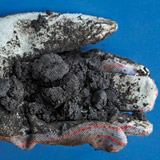
It opens to a three-page aerial spread of pristine boreal forest dotted with lakes beaming through the trees as a luminescent robin-egg blue. This is the “before” picture. Flip over the foldout at the front of next month’s National Geographic magazine and the reader is confronted by the “after” photo, a ground zero of environmental devastation with sickly grey ponds bisected by slick roadways prowled by mammoth trucks carrying black gold.This photo shoot for the magazine’s influential global audience is described as the “baby-seal moment” for Alberta’s oil sands, a public relations hell that will be very difficult to overcome, no matter how reasoned the argument.
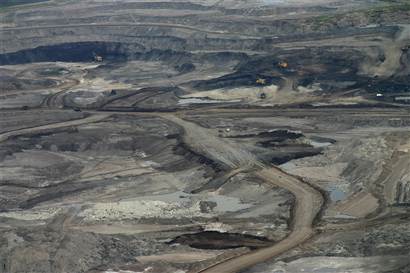
18 February
Obama’s sticky issue with Canada: oil sands
(MSNBC) He cites ‘big carbon footprint’ but resource is huge, and next door
Canadian Prime Minister Stephen Harper has said energy security and the environmental impact of massive oil sands operations in Alberta province will be priorities during his meeting with Obama. Harper is expected to lobby Obama on the merits of the oil sands as a safe and secure source of oil.
21 October
‘Tar Sands’, by Andrew Nikiforuk
(CTV) Nations become what they produce. Bitumen, the new national staple, is redefining the character and destiny of Canada. Rapid development of the tar sands has created a foreign policy that favours the export of bitumen to the United States and lax immigration standards that champion the import of global bitumen workers. Inadequate environmental rules and monitoring have allowed unsustainable mining to accelerate. Feeble fiscal regimes have enriched multinationals and given Canada a petrodollar that hides the inflationary pressures of peak oil. Canada now calls itself an “emerging energy superpower.” In reality, it is nothing more than a Third World energy supermarket. Investment in the tar sands, including pipelines and upgraders, now totals approximately $200 billion. The tar sands boom has become the world’s largest energy project, the world’s largest construction project, and the world’s largest capital project. No comprehensive assessment of the megaproject’s environmental, economic, or social impact has been done.
2 October
William Marsden: “Stupid to the Last Drop – How Alberta Is Bringing Environmental Armageddon to Canada (And Doesn’t Seem to Care)”
In its desperate search for oil and gas riches, Alberta is destroying itself. As the world teeters on the edge of catastrophic climate change, Alberta plunges ahead with uncontrolled development of its fossil fuels, levelling its northern Boreal forest to get at the oil sands, and carpet-bombing its southern half with tens of thousands of gas wells. In so doing, it is running out of water, destroying its range land, wiping out its forests and wildlife and spewing huge amounts of greenhouse gases into the atmosphere, adding to global warming at a rate that is unrivalled in Canada or almost anywhere else in the world. It’s digging, drilling and blasting its way to oblivion, becoming the ultimate symbol of Canada’s – and the world’s – pathological will to self-destruct.
May 2008
Bird Deaths in Tailings Ponds Renews Questions About Tar Sands Impact on Environment
(Nature Canada) Renewed calls for a moratorium on new oil sands production are being made after more than 500 ducks were severely oiled when they landed on a toxic tailings pond in northern Alberta in April. The migratory birds landed on a pond filled with toxic waste from the oil sands operation at Syncrude’s Aurora North Site mine, north of Fort McMurray. The Alberta government is investigating.
6 December 2007
Heather Mallick: BP is making a return to the Canadian province of Alberta, which deserves better than to be abused by oil companies
(Guardian Unlimited) So BP is finally returning to Canada’s black hell. Welcome back, stout British Petroleum. Eight years after you shunned our tarry oil deposits for the watery, more profitable Russian stuff, your desperate need for oil has brought you back to Alberta, batting your eyelashes and fanning yourself with $10bn in cash. The Alberta tar sands of northern Canada – how can I put this politely – are the planet’s patch of black armpit hair. At least that’s how it looks from space. If you live near them, though, it’s like being on a crowded bus on a hot day with your nose shoved up against someone’s fetid oily thicket, and inhaling.
4 July 2006
Jeffrey Simpson: Alberta’s tar sands are soaking up too much water
A cubic metre of oil, mined from the tar sands, needs two to 4.5 cubic metres of water. Approved oil sands mining operations — not the in situ kind that extract oil from tar sands far below the surface — will take twice the annual water needs of the City of Calgary. The water will come from the Athabasca River, from which 359-million cubic metres will be diverted. More than 7 per cent of Alberta’s total water allocations — surface water and groundwater — is consumed by the oil and gas industry.
1 May 2006
Troubled Waters, Troubling Trends (Summary Report)
By: Mary Griffiths, Amy Taylor, Dan Woynillowicz
Oil sands mining operations in Alberta use large volumes of water from the Athabasca River. Steam injection to produce oil from bitumen that is too deep to mine (in situ production) uses increasing amounts of surface water and groundwater. Production of bitumen is expected to triple by 2020, resulting in more water withdrawals, declining wetlands and expanding tailings ponds. Most companies recycle water, so new technology and policies outlined in the report are needed to reduce water use. Alberta’s Water Conservation and Allocation Policy for Oilfield Injection, which applies to conventional and thermal enhanced oil recovery, must be strictly implemented. The Full report [PDF]
April 2005
Shifting Sands – Canada has plenty of oil, while China and the US are thirsty and desperate
(Walrus) The oil sands are the largest hydrocarbon deposit in the world, three separate fields that hold 1.6 trillion barrels of heavy crude. Nearly 174 billion barrels are listed as reserves, meaning oil that is recoverable using existing technology under current economic conditions. It is expensive to get out of the ground—it cost Syncrude $18.61 per barrel last year compared to roughly $1 for Saudi oil—but it represents the world’s most stable supply. When Suncor (then Sun Oil) began production in Fort McMurray in 1967, the oil sands were viewed by much of the industry as experimental folly. But the cost of extraction has steadily declined while the price of oil has gone up.




2 Comments on "Shifting sands: Canada, the world and the tar sands"
This is the first time that I have read your site. Very informative and surely will be booked into my fav’s. I was most intrigued about the coverage of the oil sands. I recently came across a site that I thought you might be interested in, it’s http://www.canadasoilsands.ca. I am pretty sure it’s industry, but I liked reading about the “sands” there and it seemed like a good tool to get information from.
I am just curious as to what will be done with the Alberta Tar Sands (renamed oil sands by some for PR purposes no doubt) will have to be shut down because the world wide climate requires that we have to quit burning the stuff. This will happen sooner or later. I give it three years – five years tops.